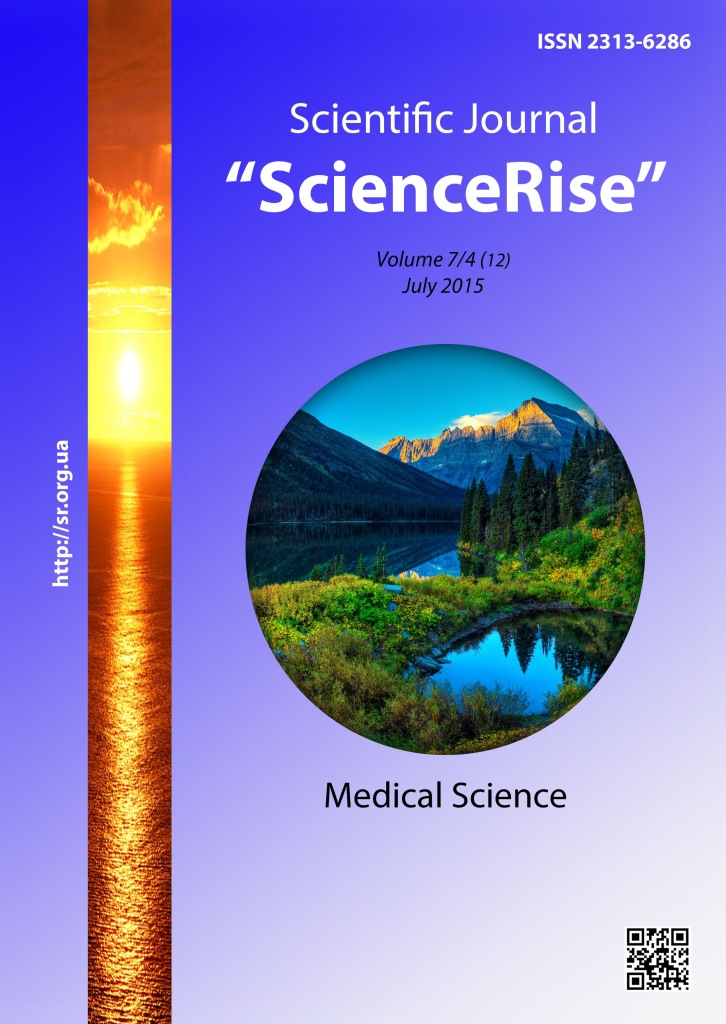The problem of mental disorders and psychological effects of antitumour treatment in children with cancer pathology
DOI:
https://doi.org/10.15587/2313-8416.2015.47412Keywords:
mental disorders, psychological disturbances, cancer disease, children, medical and psychological help, psycho rehabilitation.Abstract
Aim – analysis of the problem of psychological and psychiatrical aspects of impact of cancer disease on child and its parents for detection of the main directions of medical and psychological help to this contingent.
Results. In the younger age group the most stress factors that provoke the development of psychogenic fears, anxiety states and the derivative mood disorders are the “hospital routine” – limitation of activity (playing, motor), subjectively heavy procedures and manipulations, pain. In the group of elder children and teenagers the main stress stimulus is connected with a fear of social consequences of disease and the fact of mortally dangerous disease is interpreted in mind as a threat to the successful social functioning as something that spread its negative impact on the future life. Reactively caused mood disorders prevail in this age group over the other psychogenic formations. Behavior reactions in these cases are the secondary ones relating to the mood disorders – to the acceptance or rejection the situation of disease (as an anxious hypochondriacal fixation or as an emotional denial and ignoring the possible grave effects of cancer process).
Conclusion. The diversity of problems in child psycho-oncology causes the multilevelness and versatility of medical, psychological and psychosocial help and psycho rehabilitation of children and their parents
References
Piontkovskaya, O. V. (2012). Children Psycho-Oncology: problems and solutions. Archives of Psychiatry, 18 (4 (71)), 76–84.
Holland, J. C., Breitbart,W. S., Jacobsen P. B. et al. (2010). Psycho-Oncology. Oxford Universitypress, 712.
Markova, M. V., Piontkovskaya, O. (2014). Comprehensive medical and psychological care in pediatric oncology: rationale, content, effectiveness [Text] / M. Markova, // Psychological counseling and psychotherapy, 1–2, 95–115.
Markova, M., Piontkovskaya, O., Kuzhel, I. R. (2013). Problems message diagnosis and communication with the child with cancer and his or her parents. Medical Psychology, 1, 7–13.
Markova, M., Piontkovskaya, O., Kuzhel, I. R. (2012). Status and prospects of development of modern psychooncology [Text] / M. Markova, O. Piontkovskaya, IR Kuzhel // Ukrainian neuropsychiatrist Bulletin, 20 (4), 86–91.
Revenok, A. A., Oleinik, O. P. (2012). Cancer pathology and capability. Research Institute for Social and Forensic Psychiatry, LAT & K, 379.
Rumyantseva, A. (2007). Achievements and prospects of development of high technologies in Pediatric Hematology and Oncology. Questions of hematology / oncology and immunopathology in pediatrics, 3, 7–25.
Kovalev, D. V., Koposov, P. V., Kovalev, V. I. (2004). Malignant tumors in children. Moscow : EliksKom, 324.
Eiser, C., Hill, J. J., Vance, Y. H. (2000). Examiningthepsychologicalconsequencesofsurvivingchildhoodcancer: systematicreviewas a researchmethodinpediatricpsychology. J. PediatrPsychol, 25 (6), 449–460.
Chen, E., Zeltzer, L. K., Craske, M. G. et al. (2000). Children'smemoriesforpainfulcancertreatmentprocedures: implicationsfordistress. ChildDev, 71 (4), 933–947.
Pisarenko, H. A. (1998). Psychologicaladaptationofthefamilyofthechildwithcancerat a stageofremission. RussianBulletinPerinatologyandpediatrics, 3, 39–41.
Tremolada, M., Bonichini, S., Altoè, G., Pillon, M., Carli, M., Weisner, T. S. (2011). Parental perceptions of health-related quality of life in children with leukemia in the second week after the diagnosis: a quantitative model. Supportive Care in Cancer, 19 (5), 591–598. doi: 10.1007/s00520-010-0854-5
Tkachenko, I. V. (2011). Evaluation of medical and social rehabilitation of children and adolescents cured of hematological diseases, in terms of quality of life. Problems of health management, 4, 68–69.
Volodin, N. N., Kasatkin, V. N., Zeitlin, G. Y. et al. (2015). The strategy of medical, psychological and social rehabilitation of children with hematological and oncological diseases. Hematology, 1, 7–15.
Kenzhegulova, R. B., Omarov, K. O., Sklyar, S. V. (2010). Neuropsychiatric disorders in children with acute leukemia at the stages of the program of chemotherapy. Mental health of children and adolescents (clinical epidemiological and biological aspects). Abstracts. Tomsk, 91–93.
Kiyan, I. G. (2002). Anxiety in children with acute lymphoblastic leukemia. Health School. Moscow, 3, 36–41.
Madan-Swain, A., Brown, R. T., Foster, M. A. et al. (2000). Identity in Adolescent Survivors of Childhood Cancer. Journal of Pediatric Psychology, 25 (2), 105–115. doi: 10.1093/jpepsy/25.2.105
Derogatis, L. R., Morrow, G. R., Fetting, J. et al. (1983). The prevalence of psychiatric disorders among cancer patients. JAMA: The Journal of the American Medical Association, 249 (6), 751–757. doi: 10.1001/jama.249.6.751
Downloads
Published
Issue
Section
License
Copyright (c) 2015 Оксана Владимировна Пионтковская

This work is licensed under a Creative Commons Attribution 4.0 International License.
Our journal abides by the Creative Commons CC BY copyright rights and permissions for open access journals.
Authors, who are published in this journal, agree to the following conditions:
1. The authors reserve the right to authorship of the work and pass the first publication right of this work to the journal under the terms of a Creative Commons CC BY, which allows others to freely distribute the published research with the obligatory reference to the authors of the original work and the first publication of the work in this journal.
2. The authors have the right to conclude separate supplement agreements that relate to non-exclusive work distribution in the form in which it has been published by the journal (for example, to upload the work to the online storage of the journal or publish it as part of a monograph), provided that the reference to the first publication of the work in this journal is included.

